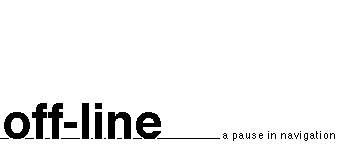 |
 |
Are we helping them? May 1998 |
 |
 |
Are we helping them? May 1998 |
| Giancarlo Livraghi gian@gandalf.it |
|
| |
||
| It’s happening. From several indicators it appears that, while we are
still far behind American or even European
levels, use of the net is beginning to spread also in "backward" countries, such
as Italy. People that only a few months ago weren’t interested or were deliberately
staying away (we can’t blame them if we consider the hype, the scares and the
nonsense that mainstream media are still spreading) now have a mailbox and are beginning
to look around. Of course figures on numbers of net users are as confused and unreliable
as they have always been, but there is growth. Half of the people we meet online,
and we shall meet in the next few months, have less that a year’s experience. The net has a great tradition of greeting and helping newcomers – newbies, as we used to call them. Quite often they ask questions that seem silly (didn’t we all, when we first started?) They are easily confused and put off by messy technologies that pretend to be "friendly" but don’t fit the process of a human mind. A friend of mine is one of the brightest people I have ever met; but when he was faced with a function called "remote access" he ignored it ("who wants that, I need access here and now".) An equally bright lady, that has been using a computer for many years, bought a modem in a shop in Milan and found in the package a cd-rom offering free access to American services; when she followed instructions and tried to connect, she fiddled in every possible way but nothing worked... it took her a while to understand that the connections offered were not available in Europe. An obvious, fact, such as the need to disable the default dial tone check (as it only understands an American dial tone) is hardly ever explained, except in cryptic language on page 58 of an overtechnical manual. The service support of providers is often very poor; phone services don’t answer (people can’t use online help until they are online – and online services are not very good, either.) When they answer, they don’t know how to help new users. Most of the "trial access" offers have bugs (it took a couple of hours, trying to help a friend to get online, before we found out that we weren’t making any mistakes in the cumbersome procedure – but the registration server of a big provider was down, right in the middle of a major promotional campaign.) I could go on for many pages with examples of how the approach can be difficult and boring. For most people the initial experience of getting online is quite distressing. Eventually, with the help of some experts, they get over that hurdle; and get lost. They discover that search engines find everything except what they are looking for; that lists in magazines include dozens of sites but hardly anything that they find interesting; etcetera. They are confused by messy sites: too many pictures, too many useless tricks, homepages that don’t help to explore content (if there is any content worth exploring.) Most websites are a waste of time, and a lot of time is wasted because of bandwidth overload. Unless they ask a friend, most new users have no idea of where they can find a mailing list, a newsgroup or a chatline. I’ve seen 400-page manuals, sold in bookstores or published by installments in newspapers or magazines, with mountains of technical details that are quite irrelevant for most people – and no indication of where to find software or how to download it. I think experienced people should do their best to help newcomers. Especially to bypass the continuing hype on appearances and technicalities – and find the real values. This is a task, I think, also for companies that have an online presence. The new ones, testing the net, as well as those that have been online for a while but not achieving good results. I still hear awful stories such as "Well, your website is nearly ready, which mailboxes should we include?" "Oh no, you don’t mean we should actually answer mail? It’s even worse when we find sites that do have mailboxes, but nobody ever answers. Entrepreneurs and managers aren’t stupid; if they make such silly mistakes, it’s because nobody has explained clearly enough what being online really means. The road is uphill. We need a serious commitment from all the people and organizations that provide service, information and education, to get out of the hype and technomania and establish a much more sound understanding of real values. Human culture and business on the net aren’t separate or conflicting worlds. They are two parts of the same system: if one works well, so will the other. The need for a more realistic and less superficial approach begins to be felt, but a lot of work remains to be done before a mature understanding of the net and how it works can prevail. |
||